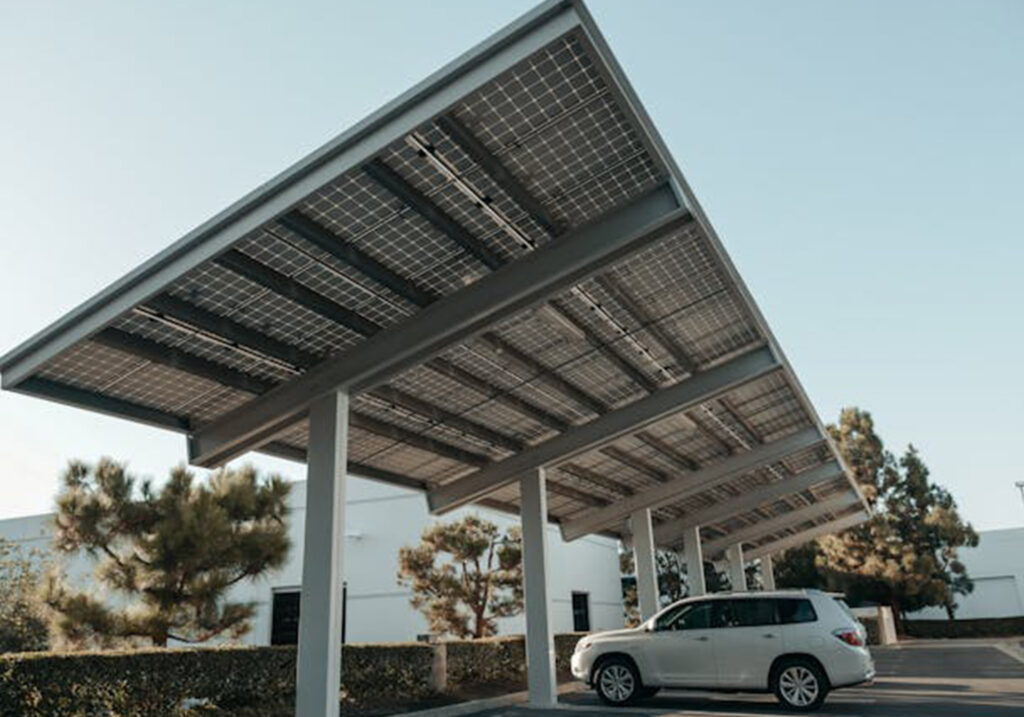When it comes to protecting your vehicle and adding functional outdoor space to your property, carports are a popular and practical solution. But the great debate still rages: Which one is better, metal or wood carport?
Choosing the right material for your carport is a key decision you need to make as a property owner. Steel and wood are both common building materials, and each one has its own strengths and weaknesses.
That is why choosing between a metal and a wood carport can be challenging. This comprehensive guide will explore the differences between metal and wood carports, comparing their durability, cost, maintenance, aesthetics, environmental impact, and more to help you determine which option is best for your home.
Durability and Strength
Metal Carports
Metal carports, especially those made from steel or aluminum, are renowned for their durability. Steel carports are particularly strong, capable of withstanding heavy snow loads, high winds, and harsh weather conditions. Galvanized steel and coated aluminum are resistant to rust, corrosion, and pests, making them an excellent long-term investment. Additionally, metal carports are less susceptible to fire damage compared to wooden structures. This inherent resistance to environmental stressors means metal carports can provide reliable protection for vehicles and equipment for decades with minimal signs of wear and tear.
Another advantage of metal carports is their ability to maintain structural integrity with minimal maintenance. Unlike wood, which can warp, crack, or become infested with termites over time, metal retains its strength and shape under extreme conditions. This resilience is especially beneficial in regions prone to severe weather events such as hurricanes, heavy snowfall, or intense heat. The robust construction of metal carports not only extends their lifespan but also reduces the frequency and cost of repairs, offering homeowners peace of mind and long-term value.
Wood Carports
Wood carports offer natural strength and can be quite sturdy when constructed with high-quality lumber such as cedar, redwood, or pressure-treated wood. These types of wood are naturally more resistant to decay and insects, providing a solid and dependable structure. However, wood is more vulnerable to environmental elements like moisture, termites, and rot. Without proper maintenance, wood carports can deteriorate over time, especially in humid or rainy climates. Regular treatments, sealing, and inspections are necessary to ensure the longevity of a wooden carport.
Additionally, wood is susceptible to warping, cracking, and splitting due to fluctuations in temperature and humidity. This can compromise the structural integrity of the carport over time, necessitating repairs or even full replacements. While wood carports can be designed to handle heavy loads, they generally require more upkeep to maintain their strength and appearance. Despite these challenges, many homeowners choose wood for its aesthetic appeal and its ability to blend seamlessly with traditional or rustic home designs.
Cost and Affordability
Metal Carports
Metal carports are often more cost-effective upfront compared to their wood counterparts, making them an attractive option for homeowners and businesses alike. The widespread availability of prefabricated metal carport kits allows for quick and easy installation, significantly lowering labor costs. These pre-engineered kits come with all necessary components, which reduces the need for custom fabrication and ensures faster assembly, ultimately saving both time and money.
Beyond initial costs, metal carports are known for their long lifespan and low maintenance needs, further enhancing their affordability over time. Metal structures are highly durable and resistant to elements such as rain, snow, and extreme temperatures, which means they require less frequent repairs or replacements than wood carports. Additionally, metal surfaces are less likely to suffer from issues like rot, pest damage, or warping, contributing to the overall value of the investment. This combination of lower initial costs and long-term durability makes metal carports a smart choice for those seeking both economy and reliability.
Wood Carports
Wood carports are typically more expensive than metal alternatives, largely due to the cost of lumber and the labor-intensive process required for construction. The price of high-quality wood materials, such as cedar or redwood, can quickly add up, especially when custom designs or specialized treatments are involved. In addition, building a wood carport often requires skilled labor to ensure proper construction, which can further increase costs. Moreover, additional treatments for weatherproofing, such as staining, sealing, or applying protective coatings, add to the overall expense of maintaining a wood structure over time.
Despite the higher upfront costs, many homeowners are willing to invest in wood carports for the aesthetic appeal and customization options they offer. Wood provides a natural, timeless look that complements a variety of architectural styles, making it a popular choice for those seeking to enhance the visual appeal of their property. Furthermore, wood carports can be easily tailored to fit specific design preferences, whether it’s a unique roof shape, custom trim details, or a variety of finishes. For some, the enhanced curb appeal and the ability to create a more personalized structure justify the higher price, making it a worthwhile investment for their home.
Maintenance Requirements
Metal Carports
Metal carports require minimal maintenance. Occasional cleaning and inspections for rust or corrosion are typically sufficient to keep them in good condition. Galvanized or powder-coated finishes add an extra layer of protection against the elements, further reducing maintenance needs.
Wood Carports
Wood carports demand regular maintenance to prevent damage from moisture, pests, and UV exposure. This includes periodic staining or painting, sealing, and treating the wood to protect it from rot and insects. Neglecting maintenance can lead to costly repairs or structural failure.
Aesthetics and Design Flexibility
Metal Carports
Metal carports offer a sleek, modern appearance that complements contemporary and industrial-style homes. They are available in various colors, finishes, and designs, but customization options are generally more limited than wood. Metal carports can be designed to blend with existing structures but may lack the warmth and charm of wood.
Wood Carports
Wood carports excel in aesthetics and design versatility. They can be customized to match the architectural style of a home, offering a rustic, traditional, or craftsman look. Wood allows for intricate designs, decorative elements, and finishes that enhance curb appeal, making it a popular choice for homeowners prioritizing visual harmony.
Environmental Impact
Metal Carports
Metal carports are considered environmentally friendly due to the recyclability of steel and aluminum. Many metal carports are made from recycled materials, reducing the need for raw material extraction. Additionally, the energy-efficient manufacturing processes and longevity of metal carports contribute to a lower environmental footprint.
Wood Carports
Wood is a renewable resource, making it an eco-friendly option when sourced from sustainable forests. However, deforestation and the environmental impact of chemical treatments for weatherproofing can offset some of the environmental benefits. Choosing certified sustainable wood can help mitigate these concerns.
Installation and Construction
Metal Carports
Metal carports are often easier and faster to install than wood carports. Prefabricated kits come with pre-cut components and clear instructions, allowing for DIY installation or quick professional assembly. The lightweight nature of aluminum and modular designs contribute to reduced construction time and costs.
Wood Carports
Wood carports require more complex construction, often necessitating skilled labor for proper assembly. Custom designs may involve intricate carpentry and longer construction timelines. Site preparation and foundational work may also be more extensive, leading to higher installation costs.
Weather Resistance
Metal Carports
Metal carports are highly resistant to extreme weather conditions. Galvanized steel and aluminum resist rust, corrosion, and pests, making them suitable for regions with heavy rainfall, snow, or humidity. Metal structures can also be engineered to withstand high winds and seismic activity.
Wood Carports
Wood carports can be durable but are more vulnerable to moisture, rot, and insect damage. Proper sealing and maintenance are necessary to ensure longevity, especially in areas with fluctuating weather conditions. Heavy snow loads or high winds can also pose challenges for wood structures without reinforced designs.
Longevity and Lifespan
Metal Carports
With proper maintenance, metal carports can last 30 to 50 years or more. Their resistance to rust, pests, and fire significantly extends their lifespan, making them a reliable, long-term investment.
Wood Carports
Wood carports typically have a shorter lifespan, often ranging from 15 to 30 years depending on maintenance and environmental exposure. Regular upkeep is essential to prevent premature deterioration and maximize longevity.
Customization and Expansion
Metal Carports
While metal carports offer fewer customization options, they can still be expanded or modified with additional features like side panels, enclosures, and integrated storage. Some manufacturers offer customizable designs to fit specific needs.
Wood Carports
Wood carports provide greater flexibility for customization and expansion. Homeowners can easily modify designs, add decorative elements, or integrate additional storage and workspace areas. This adaptability makes wood carports ideal for unique property layouts.
Resale Value and Curb Appeal
Metal Carports
Metal carports can enhance property value, especially when designed to match the home’s architecture. Their durability and low maintenance appeal to buyers seeking practical vehicle protection.
Wood Carports
Wood carports can significantly boost curb appeal, especially when they complement the home’s design. Their aesthetic charm can increase property value, making them a desirable feature for potential buyers.
Conclusion
Metal carports excel in durability, low maintenance, and cost-effectiveness, making them ideal for homeowners seeking long-term, hassle-free protection. Wood carports, on the other hand, offer unmatched design flexibility and visual appeal, making them perfect for those who prioritize aesthetics and customization.
By weighing the pros and cons of each material, you can make an informed decision that enhances your home’s functionality and value.

